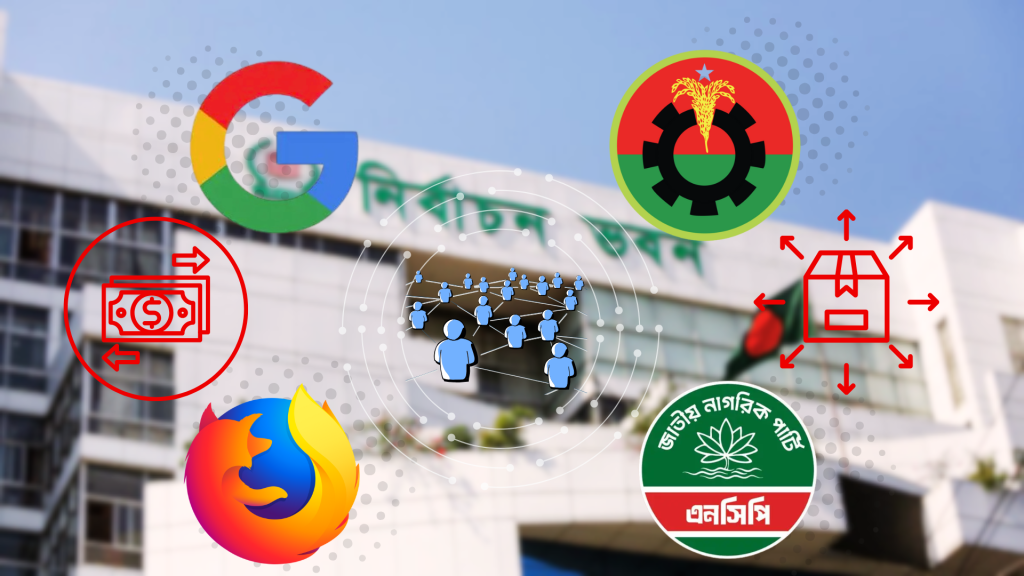Why allowing NCP a few seats in the upcoming parliament could be BNP’s smartest long-term move
Most people don’t know this, but Google is the single biggest financial backer of the Firefox browser.
At first glance, that sounds absurd.
Why would Google, whose Chrome browser commands over 60% of global market share, spend millions keeping a rival alive?
The answer lies in strategic foresight. Google funds Firefox to maintain the illusion of competition and avoid anti-trust scrutiny. In simple terms, it ensures its “competitor” remains just strong enough to protect its near-monopoly.
Politics, like markets, rewards those who think ahead.
The BNP, poised for an overwhelming victory in the coming general election, can afford to play the long game. The party’s immediate dominance gives it a strategic buffer — the space to absorb small tactical losses today in exchange for structural stability tomorrow. That’s why, counterintuitive as it may sound, BNP should seriously consider giving a few parliamentary seats to the National Citizens’ Party (NCP).
WHY IT MAKE SENSE
Allowing NCP a handful of seats would serve multiple purposes.
First, it would cement BNP’s image as a magnanimous, confident ruling party, one that rewards loyalty and tolerates mild dissent.
The electorate would see NCP’s presence in parliament as a BNP gesture, a token of appreciation for its alignment. NCP, for its part, could perform the symbolic role of opposition, issuing the occasional rebuke, raising harmless questions, but without posing any genuine threat to BNP’s authority.
The party would end up looking more ornamental than operational, much like the Jatiya Party (JaPa) or the Left Alliance under Awami League governments.
Second, this strategy would neutralise the risk of NCP evolving into a genuine opposition force later on. Anti-incumbency sentiment is inevitable, and by 2028 or 2029, even a minor challenger could capitalise on voter fatigue. But by pulling NCP into its orbit early, BNP can blunt that risk before it materialises. The party becomes anti-fragile, stronger because it has absorbed its potential rivals.
Third, BNP knows NCP’s survival depends on maintaining a distinct identity. Once absorbed, NCP would lose that edge. Offering them 15 to 20 seats is a small price to pay for long-term dominance — effectively neutralising a force that might otherwise threaten them in 5 to 10 years down the line.
THE JAMAAT FACTOR
BNP also faces the complex issue of its relationship with Jamaat-e-Islami. Scepticism towards Jamaat remains high, particularly among centrist and liberal voters. If BNP can integrate NCP as a cooperative but controlled partner, it not only broadens its coalition but also softens its image.
Fast-forward to the 2031 election: even if Jamaat withdraws for strategic or reputational reasons, BNP would already have a reliable “junior partner” in NCP. This arrangement could provide the façade of competitive pluralism, the same way Awami League used JaPa to simulate opposition and ensure elections appeared inclusive.
BACK TO GOOGLE
Google’s ongoing support for Firefox isn’t about generosity; it’s about insulation. If Firefox were to vanish, regulators worldwide would target Google’s near-monopoly in browser business. By keeping a “competitor” alive, Google maintains its dominance while satisfying the optics of fair competition.
BNP could apply the same logic. By sustaining NCP with limited but visible political space, BNP can maintain control while appearing pluralistic, a stable system with managed opposition. It’s a political insurance policy: small cost now, enormous protection later.
The coming months will be telling. How NCP positions itself — the tone of its statements, the distance it keeps, or closes, with BNP — will signal a great deal about its long-term intentions. The party must balance integrity, pragmatism, and optics. Every speech, every alliance, every public comment will be watched closely — not just by voters, but by the very political establishment that could either absorb or erase it.
Politics, after all, isn’t only about winning the next election. It’s about shaping the landscape in which all future elections will be fought.
Taukir Aziz is a financial economist and a political analyst.


